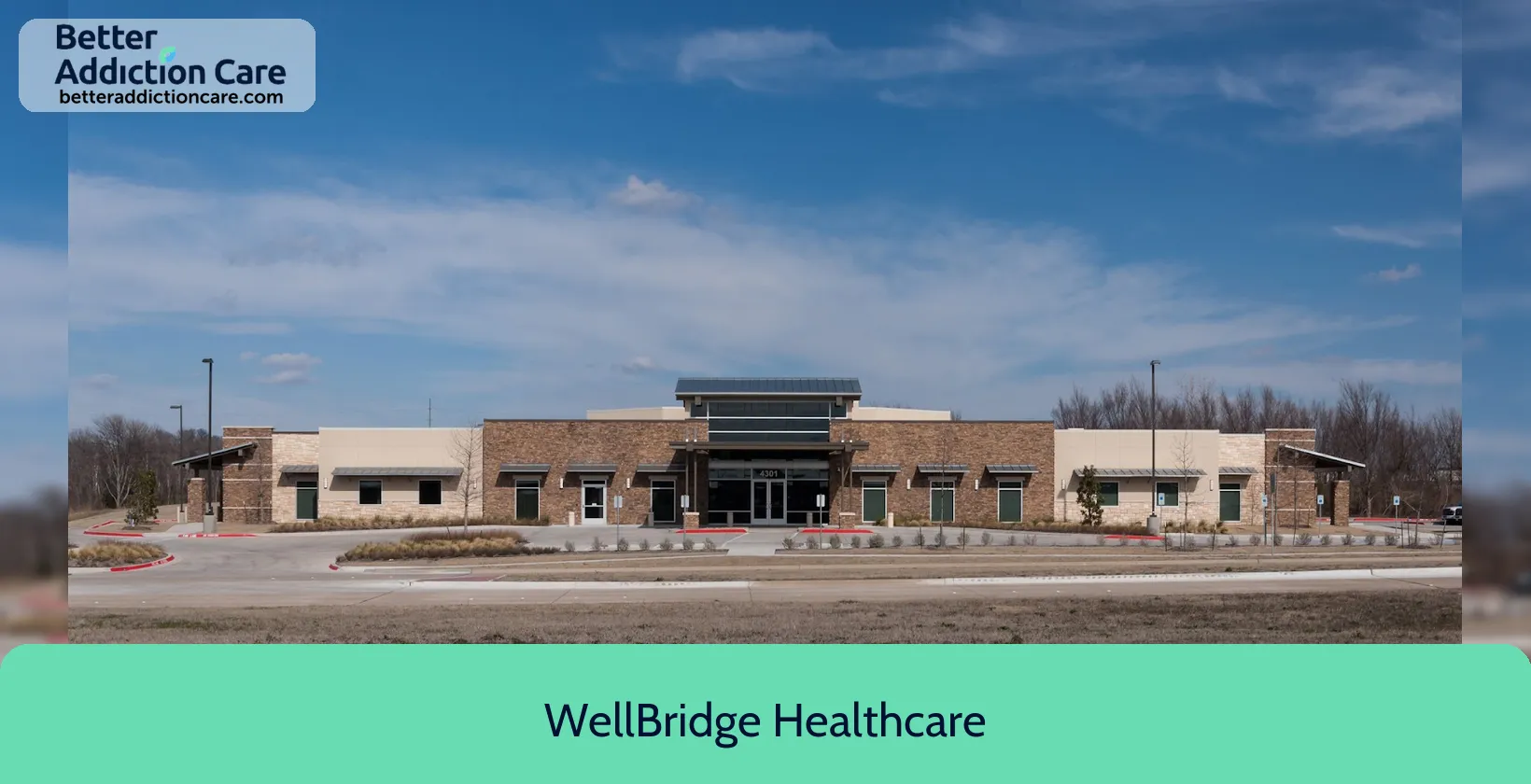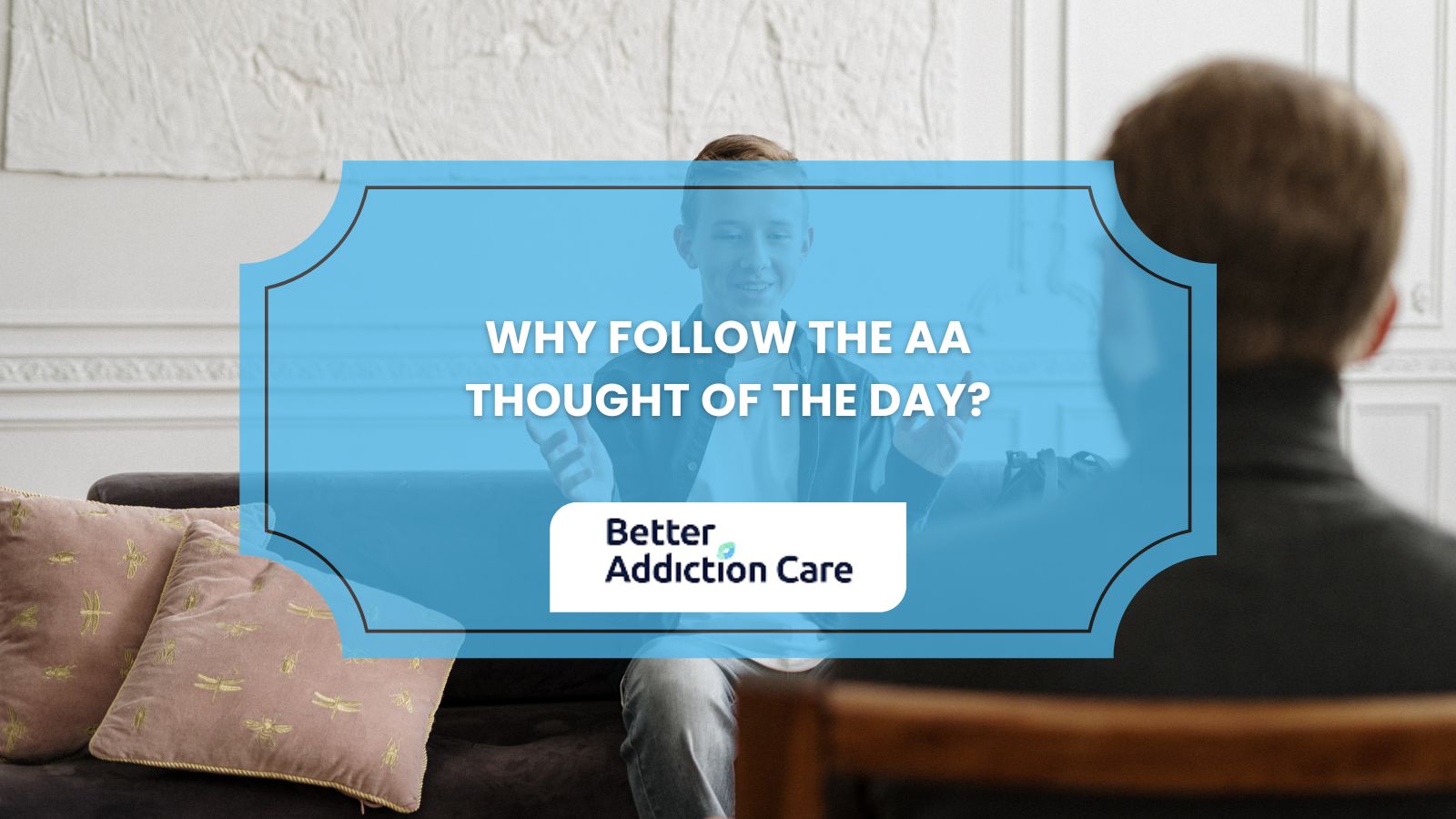Alcoholics Anonymous (AA): How the Program Supports Long-Term Recovery
Alcoholics Anonymous (AA) offers a welcoming, community-based path to recovery if you're seeking support for alcohol addiction. AA is built around the 12 Steps principles that guide personal healing, accountability, and lasting sobriety.
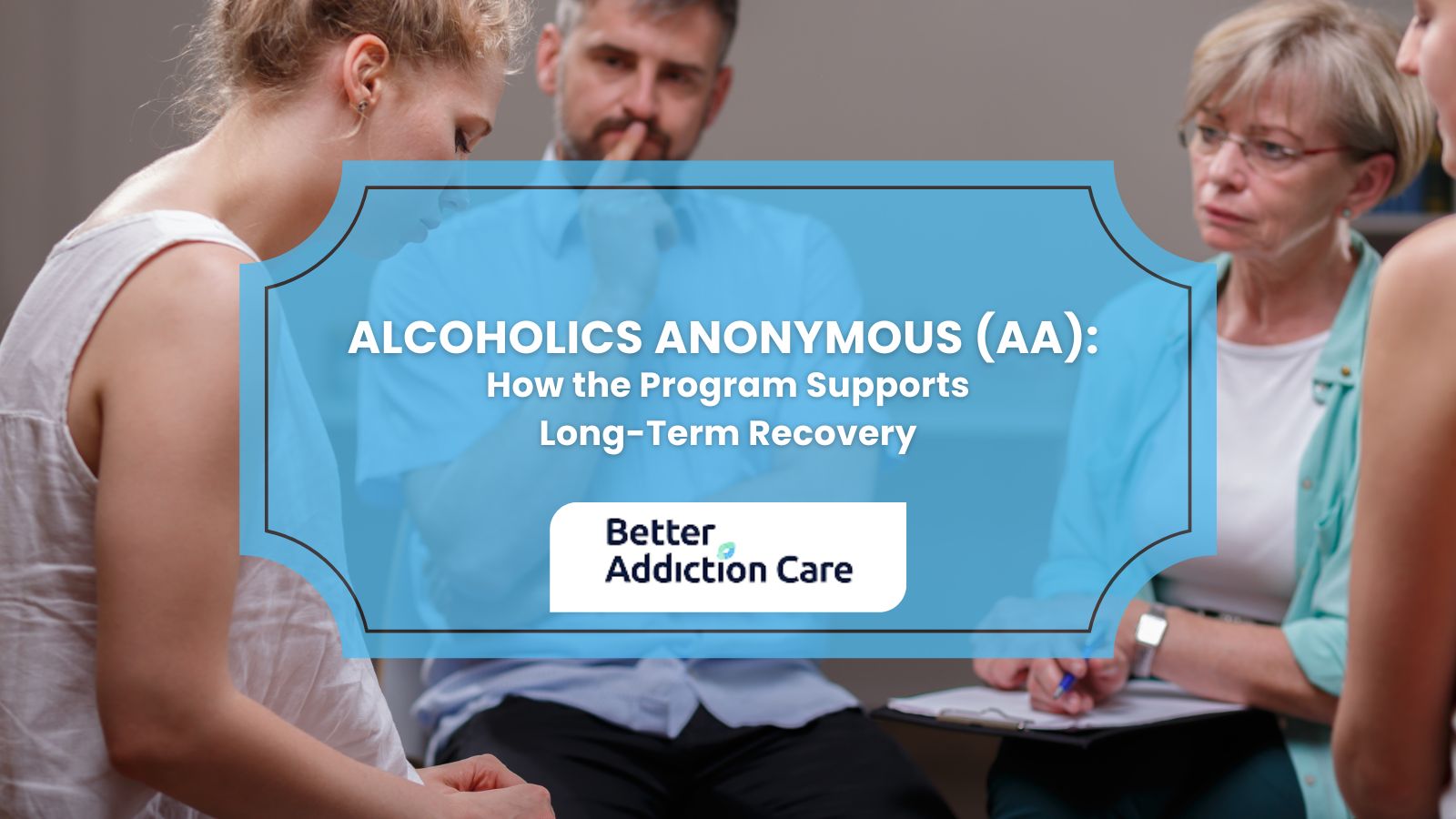
AA meetings, available in-person and online, provide a safe space to share and connect with others on the same journey. A 2020 Cochrane review (35 high-quality studies; 10,080 participants) showed AA produced 22–37% continuous abstinence, outperforming other treatments (15–25%) and reducing relapse risk by 21–66% at follow-ups (6–36 months). Many find long-term sobriety through regular participation.
AA’s benefits go beyond quitting alcohol; it fosters emotional growth, peer support, and a sense of belonging. For those looking for other options, AA alternatives like SMART Recovery, LifeRing, and Women for Sobriety offer science-based or secular approaches. Whether through AA or another path, help is available, and recovery is possible.
What Is Alcoholics Anonymous?
Alcoholics Anonymous (AA) is a worldwide mutual assistance organization and 12-step program founded in 1935 by Bill Wilson and Dr. Bob Smith to help individuals struggling with alcohol addiction achieve and maintain sobriety. It operates as a non-professional, peer-led support network where members share their experiences to help one another stay abstinent. This spiritual and personal growth framework guides members through admitting powerlessness over alcohol, seeking support, making amends, and committing to ongoing recovery. AA emphasizes anonymity, individual responsibility, and regular group meetings, fostering a sense of community and mutual encouragement for those committed to living alcohol-free lives.
What are the 12 steps of Alcoholics Anonymous?
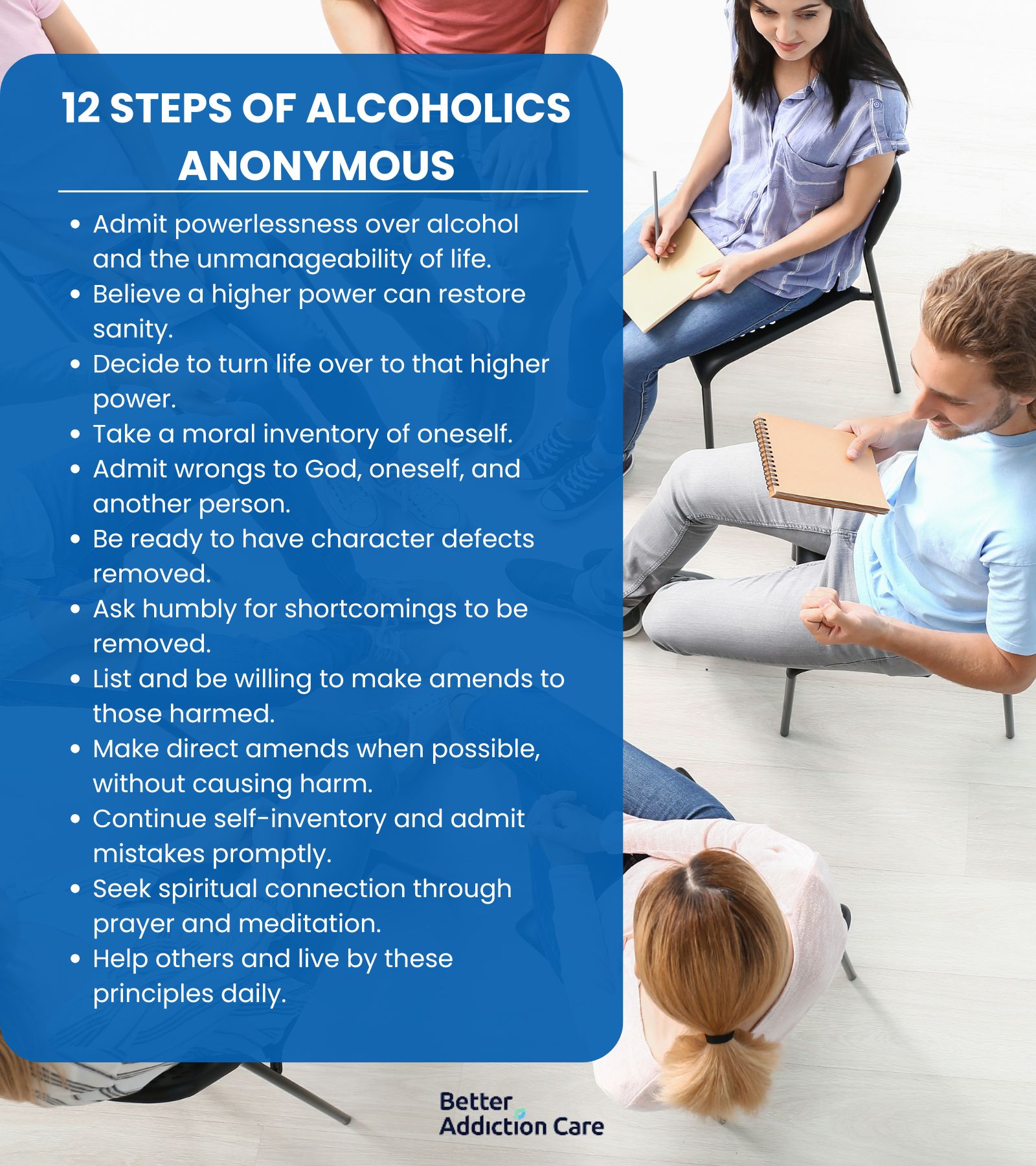
The 12 steps of Alcoholics Anonymous are a spiritual framework for recovery, including acceptance, recognizing powerlessness, and seeking guidance from a higher power. These steps guide sobriety seekers through personal healing, accountability, and service:
-
Admitting powerlessness over alcohol and accepting that life has become unmanageable.
-
Believing in a power greater than ourselves that restores us to sanity.
-
Deciding to turn our will and lives over to the care of that higher power.
-
Conducting a searching and fearless moral inventory of ourselves.
-
Admitting to God, ourselves, and another person the exact nature of our wrongs.
-
Being entirely ready to have our defects of character removed.
-
Humbly asking our higher power to remove our shortcomings.
-
Making a list of people we harmed and becoming willing to make amends.
-
Making direct amends wherever possible, unless it harms them or others.
-
Continuing personal inventory and promptly admitting when we’re wrong.
-
Seeking through prayer and meditation to improve our conscious contact with our higher power.
-
Carrying the message to others and practicing these principles in all our affairs.
These steps form the foundation of AA’s recovery process, promoting honesty, humility, and spiritual growth.
What Are Alcoholics Anonymous Meetings?
Alcoholics Anonymous (AA) meetings are regular gatherings where individuals struggling with alcohol addiction share experiences to support each other in staying sober. Meetings last 60 to 90 minutes and take place in locations like office buildings, churches, or treatment centers, with both in-person and online options available. There are two main types: open meetings, which welcome anyone, and closed meetings, reserved for those with a desire to stop drinking. Formats vary and include speaker sessions, step discussions, or open group sharing. The core purpose of AA meetings is to encourage abstinence through peer support and consistent attendance.
How Does an A.A. Meeting Help in Addiction Recovery?
A.A. meetings aid addiction recovery by offering peer support, structured routines, and shared experiences that promote accountability and reduce isolation. Regular attendance builds self-efficacy and strengthens sober social networks, which are key to maintaining abstinence. A 2020 Cochrane review found that AA participation leads to 22–37% continuous abstinence, higher than other treatments like CBT (15–25%). Additionally, a longitudinal study of 253 participants (Claire E Wilcox et al., 2015) showed that from 3 to 24 months, AA reduced depression and improved emotional stability, both of which are linked to sustained sobriety. These meetings create a consistent, supportive space that significantly enhances long-term recovery outcomes.
What Is the Success Rate of Alcoholics Anonymous (AA)?
The success rate of Alcoholics Anonymous (AA) varies, but strong evidence shows it leads to higher abstinence rates and improved long-term recovery compared to other treatments. A 2020 Cochrane review (John F Kelly, Keith Humphreys, et al.), one of the most comprehensive and high-authority analyses, found that AA and Twelve-Step Facilitation (TSF) programs resulted in 22–37% continuous abstinence, outperforming other outpatient programs like Cognitive Behavioral Therapy (CBT), which showed 15–25% abstinence rates. The same review also found that AA participation significantly reduced the risk of relapse and lowered healthcare costs over time. Furthermore, a Stanford University review confirmed that AA was up to 60% more effective than other interventions in achieving long-term sobriety. These findings underscore AA's strength as a recovery model, particularly for individuals who engage regularly with the program, offering a consistent, community-driven path to sustained abstinence and improved life outcomes.
Is A.A. Effective If Combined With Other Therapies?
Yes, AA is effective when combined with other therapies. Research shows that integrating AA with evidence-based treatments like Cognitive Behavioral Therapy (CBT) or Motivational Enhancement Therapy enhances long-term sobriety. A high-quality 2020 Cochrane review found that manualized Twelve-Step Facilitation (TSF) led to significantly higher continuous abstinence rates (risk ratio 1.21, 95% CI 1.03–1.42) compared to CBT at both 12 and 24 months. This means participants were about 21% more likely to remain abstinent. At one year, about 42% of those using TSF remained completely abstinent versus 35% in control groups. Additionally, a Stanford study found AA/TSF resulted in up to a 60% greater effectiveness in achieving long-term sobriety than standalone therapeutic approaches. These findings affirm that combining AA’s peer support, structured routine, and community with formal clinical therapies creates a more robust, enduring path to recovery.
What Are the Benefits of Alcoholics Anonymous (AA) for Addiction Recovery?
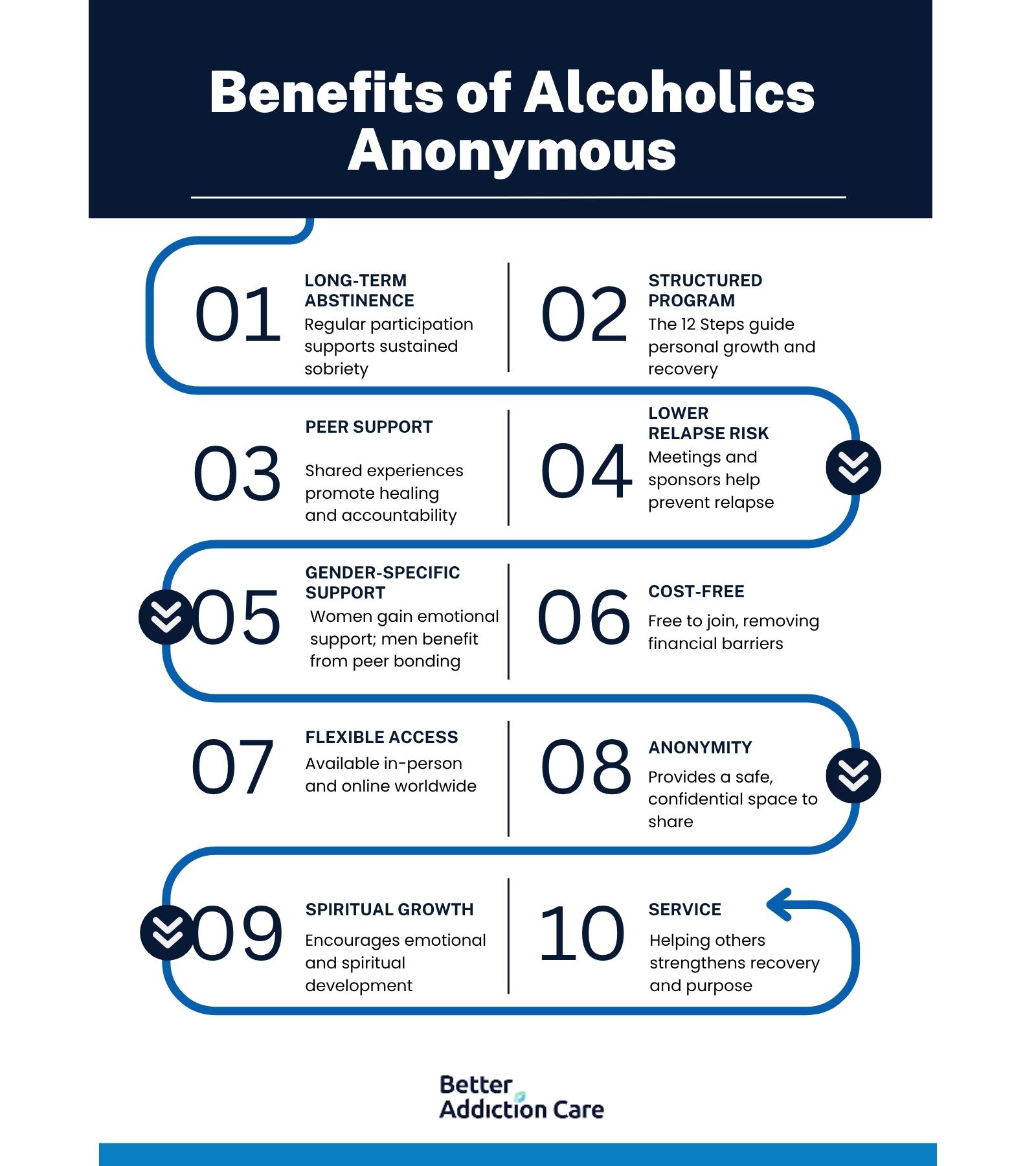
The benefits of Alcoholics Anonymous (AA) are numerous, including long-term abstinence, emotional stability, and peer-supported recovery. When combined with other treatments, its effectiveness is even greater.
Key benefits include:
-
Long-Term Abstinence from Alcohol: AA helps individuals maintain long-term sobriety, especially when combined with structured support programs.
-
Different Benefits for Men and Women: AA offers greater emotional benefits for women and higher abstinence rates for men when paired with therapy.
-
Structured Program: The 12-step model provides a clear, supportive path for personal growth and recovery.
-
Less Chance of Relapse: Frequent attendance builds coping skills and social support, lowering relapse risk.
-
Cost-Effective: AA is free and helps reduce overall healthcare and treatment costs.
What Are the Alternative Treatments for Alcoholics Anonymous (AA)?
The alternative treatments for Alcoholics Anonymous (AA) are diverse and include secular, therapeutic, and gender-specific approaches to support recovery.
The alternatives are:
-
SMART Recovery: A science-based self-help program using CBT and REBT techniques to build motivation, self-control, and balanced living without relying on a spiritual foundation.
-
LifeRing Secular Recovery: A peer-run recovery network focused on personal strength and individual growth, promoting abstinence through self-empowerment and mutual support without the use of steps or sponsors.
-
Women for Sobriety (WFS): A women-only recovery program emphasizing emotional strength, positive affirmations, and self-worth to address the unique challenges women face in addiction.
-
SOS (Secular Organizations for Sobriety): A non-religious recovery approach that encourages rational decision-making, personal responsibility, and peer support for achieving and maintaining sobriety.
-
Moderation Management (MM): A behavioral change program for people seeking to reduce their drinking rather than fully abstain, offering goal-setting, self-monitoring, and support for controlled alcohol use.
-
Outpatient Rehab: Outpatient treatment is a structured, confidential program that supports recovery with flexibility. It provides accountability with likeminded individuals under professional supervision.
Why is Alcoholics Anonymous More Effective Than Psychotherapy?
Alcoholics Anonymous (AA) is more effective than psychotherapy because it promotes long-term sobriety. A comprehensive Stanford-led analysis of 35 studies involving over 10,000 participants found that AA consistently led to higher abstinence rates than psychotherapy, boosting continuous abstinence by around 60% relative to treatments like Cognitive Behaviral therapy (CBT) and Motivational Enhancement Therapy (MET). Additionally, AA is cost-effective, reducing healthcare spending while delivering stronger recovery outcomes.
Are There Any Rules in A.A.?
Yes, there are rules in Alcoholics Anonymous (A.A.). A.A. operates through a set of Twelve Traditions and expectations that maintain unity and purpose. For example, members are expected to maintain anonymity, avoid promoting A.A. for profit, and have a genuine desire to stop drinking. Meetings follow established formats, and respectful behavior is encouraged to ensure a safe and supportive environment. These guidelines aren’t enforced by penalties but are upheld by group consensus and shared commitment. This flexible, principle-based structure allows A.A. to remain inclusive while preserving its core mission of supporting recovery through mutual aid.
How Does AA Compare to Drug Rehab Programs?
Alcoholics Anonymous (AA) and drug rehab programs share the goal of helping individuals achieve and maintain sobriety, but they differ significantly in structure, approach, and scope of services.
Alcoholics Anonymous is a peer-led, spiritually based support group that operates independently of medical or clinical supervision. It follows the 12-Step model and emphasizes regular meetings, mutual support, personal accountability, and spiritual growth. AA is free to attend, widely available, and can be accessed in-person or online. It does not provide medical detox, therapy, or psychiatric care but serves as a long-term recovery support system for those dealing with alcohol addiction.
Drug rehab programs, on the other hand, are clinically managed treatment services that may include inpatient, outpatient, or residential levels of care. Rehab typically involves medical detox, individual and group therapy, psychiatric evaluation, medication management, and aftercare planning. These programs are staffed by licensed professionals and use evidence-based therapies such as cognitive behavioral therapy (CBT), dialectical behavior therapy (DBT), and medication-assisted treatment (MAT) to address substance use disorders, including co-occurring mental health conditions.
How Better Addiction Care Helps You in Addiction Recovery?
Better Addiction Care helps you in addiction recovery by connecting you to trusted rehab centers and support services nationwide. We offer a 24/7 confidential helpline, personalized treatment placement (inpatient, outpatient, detox), insurance verification, and educational resources. By simplifying access to care and guiding people through every step, they make addiction recovery more approachable and effective.
Related Articles
Treatment Centers in Texas

